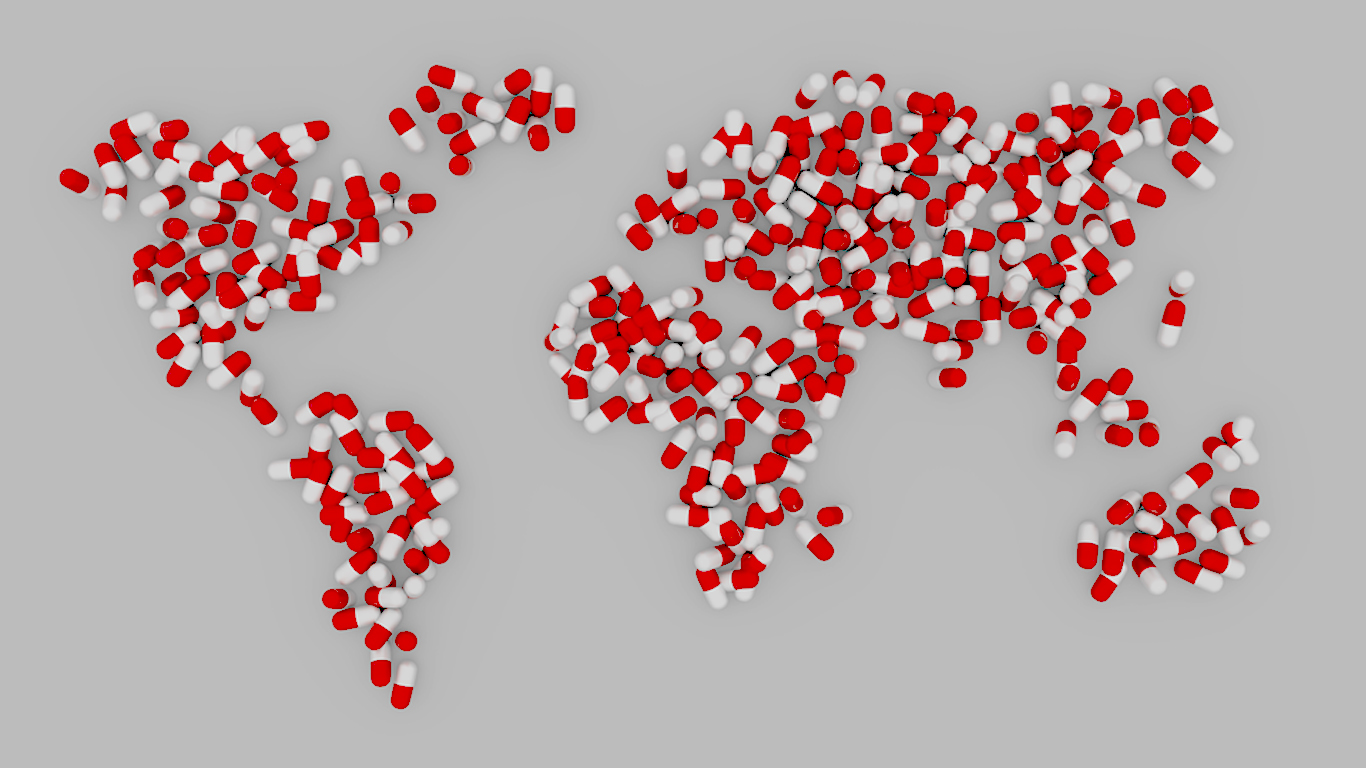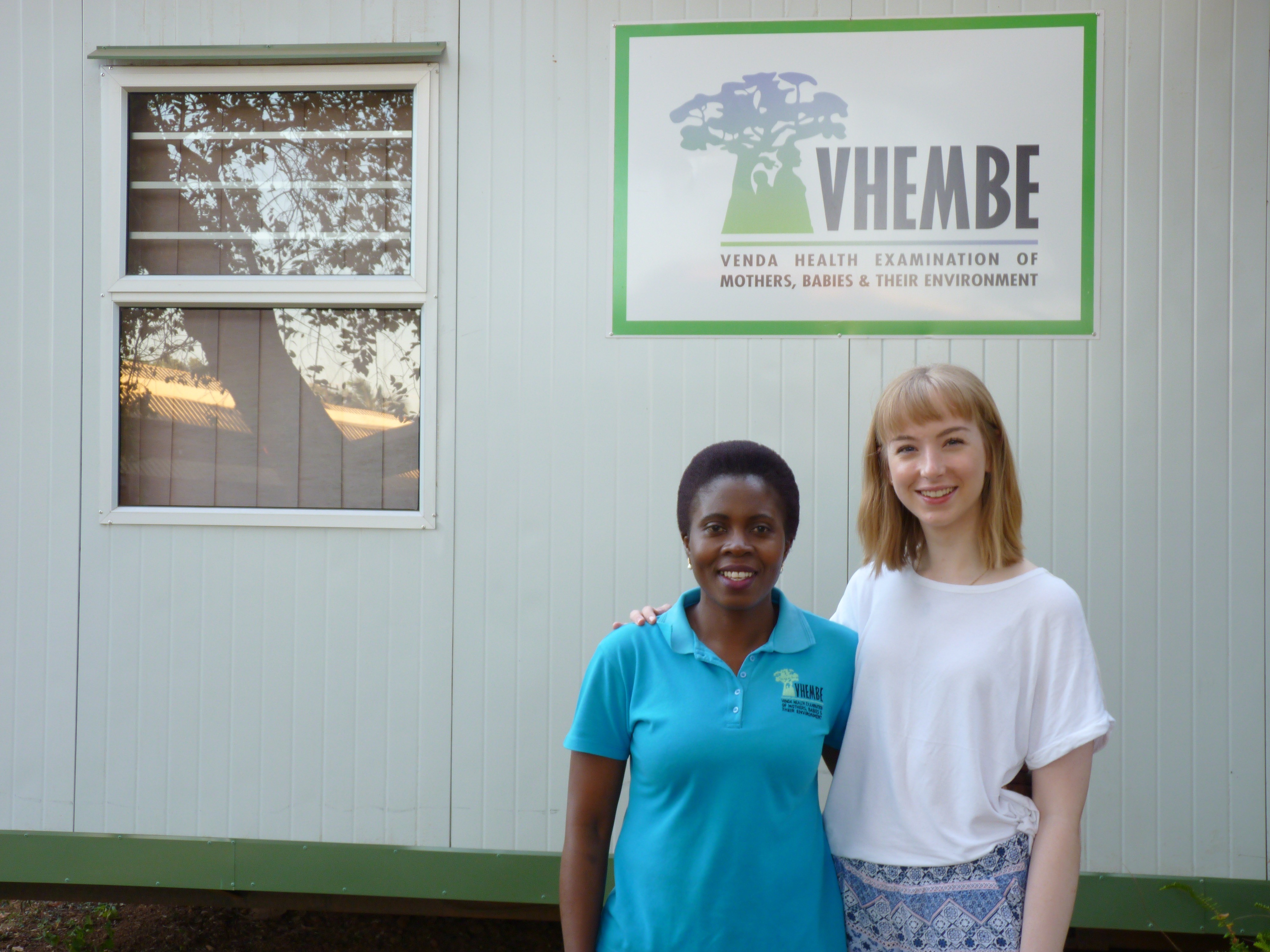Learn more about the new, interdisciplinary global health research projects supported by the Steinberg Fund for Interdisciplinary Global Health Research.

- 2025 Grantees
- 2024 Grantees
- 2020-2021 Grantee
- 2019 Grantees
- 2018 Grantees
- 2017 Grantees
- 2016 Grantees
2025 Grantees
These projects are funded via the GHP-MI4 Steinberg Seed Fund Grant, in collaboration with the McGill Interdisciplinary Initiative in Infection and Immunity (MI4).
Global health treaties to tackle the global polycrisis in an era of nationalism and populism: what factors impact consensus building?
Corresponding Principal Investigator:
Joanne Liu, Department of Global and Public Health
Co-PIs:
- Raphael Lencucha, School of Physical and Occupational Therapy
We are firmly in an era of polycrisis – pandemics, climate crisis, conflicts, and economic inequities are major challenges that require international collaboration on an unprecedented scale. Yet, lack of trust among countries, nationalist and populist approaches continue to erode global health security. In the past, countries have agreed on treaties, like the World Health Organization Framework Convention on Tobacco Control (WHO FCTC) and the Paris Agreement, to address global challenges. In May 2025, recently the Pandemic Agreement was passed in the World Health Assembly. However, with aspects such as pathogen and benefit sharing annexes remain to be finalized.
Thus, in this project, we aim to a) identify key factors impacting successful completion of the Pandemic Agreement negotiations in the original timeline (2021-24), b) identify key factors that impacted consensus building towards two past successful treaties: the WHO FCTC and the Paris Agreement c) compare factors relevant to consensus building across the three global health treaties above and provide recommendations for future negotiations and treaties. To achieve this, we will conduct a literature review and qualitative interviews with national and global experts. Our findings will be directly relevant to consensus building in global health governance and strengthening global health security.
 Joanne Liu is a Canadian practicing paediatric emergency physician and professor at McGill University’s School of Population & Global Health where she focuses on polycrisis and health emergencies. Prior to joining McGill, she was the International President of Médecins Sans Frontières for over six years from 2013-2019. Through her leadership, she spearheaded the emergency responses to humanitarian and health emergencies including outbreaks/epidemics in West (Ebola 2014-2016) and denounced the attacks on hospitals at the UNSC on May 2016 which led to the UNSC resolution 2286 on the Protection of the Medical Mission in conflict zones. She practices mediation/negotiation in conflict zones and medical emergency aid delivery in the humanitarian aid sector.
Joanne Liu is a Canadian practicing paediatric emergency physician and professor at McGill University’s School of Population & Global Health where she focuses on polycrisis and health emergencies. Prior to joining McGill, she was the International President of Médecins Sans Frontières for over six years from 2013-2019. Through her leadership, she spearheaded the emergency responses to humanitarian and health emergencies including outbreaks/epidemics in West (Ebola 2014-2016) and denounced the attacks on hospitals at the UNSC on May 2016 which led to the UNSC resolution 2286 on the Protection of the Medical Mission in conflict zones. She practices mediation/negotiation in conflict zones and medical emergency aid delivery in the humanitarian aid sector.
Evaluating the potential role of cell-free DNA in guiding tuberculosis preventive treatment: a prospective cohort study
Corresponding Principal Investigator:
Jonathon Campbell, McGill University Health Center; Research Institute-McGill University Health Center, Department of Medicine, McGill University
Co-PIs:
- Julia Burnier, Department of Oncology, McGill University
- James Johnston, Department of Medicine, University of British Columbia
Tuberculosis (TB) is an infectious disease that spreads through the air. However, being exposed to TB and becoming infected does not always mean a person will develop the illness. Unfortunately, there is currently no test that can accurately predict who will become sick. Because of this, many people are given preventive antibiotic treatment in order to stop just one person from becoming ill. This is challenging, especially since the preventive treatment can cause side effects. We believe it is possible to improve current tests to better identify who is actually at risk of getting sick after becoming infected with TB. This would help reduce the number of people who need to take preventive treatment. Our plan involves studying a biomarker—specifically, a measurable molecule released by TB bacteria into the blood, called cell-free DNA. We aim to see whether this biomarker can be detected in people who test positive for TB infection using current methods, and whether it disappears after they take preventive treatment. This could give us valuable evidence about whether the biomarker is a useful tool to guide treatment decisions, and whether it should be studied more in future research.
 Dr. Jonathon Campbell, PhD, is an Assistant Professor in the Departments of Medicine and Global and Public Health and a Junior Scientist at the RI-MUHC. He is an Associate Director of the McGill International TB Centre, a PAHO/WHO Collaborating Centre on Tuberculosis Research. His research centers on generating evidence to inform the design and implementation of novel tuberculosis prevention and care strategies. He has three major research themes: (i) research focused on better targeting and scaling-up tuberculosis prevention; (ii) research focused on tuberculosis prevention globally and its implications for tuberculosis epidemiology and prevention in low-incidence settings like Canada; (iii) research focused on informing the design of care and support programs for people affected by tuberculosis and its long-term consequences.
Dr. Jonathon Campbell, PhD, is an Assistant Professor in the Departments of Medicine and Global and Public Health and a Junior Scientist at the RI-MUHC. He is an Associate Director of the McGill International TB Centre, a PAHO/WHO Collaborating Centre on Tuberculosis Research. His research centers on generating evidence to inform the design and implementation of novel tuberculosis prevention and care strategies. He has three major research themes: (i) research focused on better targeting and scaling-up tuberculosis prevention; (ii) research focused on tuberculosis prevention globally and its implications for tuberculosis epidemiology and prevention in low-incidence settings like Canada; (iii) research focused on informing the design of care and support programs for people affected by tuberculosis and its long-term consequences.
Mapping mistrust: health-seeking and mobility patterns during infectious disease outbreaks among recently arrived immigrant communities in Montreal
Corresponding Principal Investigator:
Prativa Baral, Department of Global and Public Health
Co-PIs:
- Jiangbo Yu, Department of Civil Engineering
- Jasmine Mah, Geriatric Medicine Fellow, Dalhousie University
During infectious disease outbreaks, how people decide when and where to seek care can be heavily influenced by trust (or mistrust) in health systems. This project explores how misinformation, institutional mistrust, and social vulnerability shape health-seeking behavior and mobility patterns among recently arrived South Asian immigrants in Montreal. These communities often face language barriers, limited transportation options, and culturally specific misinformation, all of which can delay or deter access to care.
Our study combines interviews and travel surveys to understand how people in this population make decisions about care during outbreaks (like flu or COVID-19), and how they move, or choose not to move, through the city to reach clinics, pharmacies, or testing sites. We will produce geospatial maps and visualizations to show how trust and fear impact real-world care-seeking behaviors.
This pilot will generate foundational data for larger studies that we hope will facilitate more equitable, community-centered responses to future health emergencies.
 Dr. Prativa Baral, PhD is an Assistant Professor (Research) in the Department of Global and Public Health at McGill University, developing the Pandemic and Emergency Readiness Lab (PERL) alongside Dr. Joanne Liu. An epidemiologist by training, her research bridges global health, health systems, and emergency preparedness, with a focus on building more equitable and responsive infrastructures in times of crisis. Dr. Baral has worked with the World Bank, WHO, UN agencies, and others to support real-time data collection, early warning systems, and health system resilience, particularly in resource-constrained settings. She completed her PhD at Johns Hopkins Bloomberg School of Public Health and her MPH at Columbia University. Her current work centers on developing scalable solutions at the intersection of data, policy, and trust, ensuring global health systems are better prepared for the next emergency.
Dr. Prativa Baral, PhD is an Assistant Professor (Research) in the Department of Global and Public Health at McGill University, developing the Pandemic and Emergency Readiness Lab (PERL) alongside Dr. Joanne Liu. An epidemiologist by training, her research bridges global health, health systems, and emergency preparedness, with a focus on building more equitable and responsive infrastructures in times of crisis. Dr. Baral has worked with the World Bank, WHO, UN agencies, and others to support real-time data collection, early warning systems, and health system resilience, particularly in resource-constrained settings. She completed her PhD at Johns Hopkins Bloomberg School of Public Health and her MPH at Columbia University. Her current work centers on developing scalable solutions at the intersection of data, policy, and trust, ensuring global health systems are better prepared for the next emergency.
Socioeconomic and maternal factors associated with neonatal sepsis and related morbidity and mortality in Kano state, Nigeria
Corresponding Principal Investigator:
Ugochinyere Vivian Ukah, Research Institute of McGill University Health Centre (RI-MUHC), Department of Medicine, Division of Clinical Epidemiology, Faculty of Medicine and Health Sciences, McGill University
Co-PIs:
- Dan Poenaru, Department of Pediatric Surgery, McGill University
- Muktar Aliyu, Vanderbilt Institute for Global Health, Vanderbilt University
Neonatal sepsis—a serious medical condition that occurs when a baby younger than 28 days old has a life-threatening response to an infection—is a major cause of illness and death in babies worldwide. While deaths in young babies have decreased in many parts of the world, sepsis still causes a large number of deaths and complications in Nigeria and other low-resource countries. To help reduce this burden, it’s important to understand which babies are most at risk. This collaborative study will use data collected prospectively in Kano State in Northern Nigeria. We will examine how different factors—such as a mother’s socioeconomic background, pregnancy complications, and access to healthcare—may increase the chances of a newborn developing sepsis and related health problems. By identifying which babies are most likely to be affected, the study can help health care workers and policymakers create better plans to prevent, detect, and treat sepsis timely. Ultimately, the results from this research could lead to better care for young babies in places with limited resources, helping to save lives and reduce long-term health issues caused by neonatal sepsis.
 Dr. Ugochinyere Vivian Ukah, PhD is an Assistant Professor in the Division of Clinical Epidemiology, Department of Medicine, McGill University. Her research focuses on examining disparities in pregnancy complications and subsequent short- and long-term maternal and child outcomes, including development, and validation of clinical prediction models. Dr Ukah holds a master’s degree in public health (Health services research) from the University of Sheffield, England and a PhD in Reproductive and Developmental Sciences from the University of British Columbia, Canada. She completed her postdoctoral fellowship at the Department of Epidemiology, Biostatistics, and Occupational Health at McGill University. Prior to joining McGill as a Professor, Dr Ukah worked as an Assistant Research Investigator in the Pregnancy & Child Research Centre, at Health Partners Institute, Minnesota, USA.
Dr. Ugochinyere Vivian Ukah, PhD is an Assistant Professor in the Division of Clinical Epidemiology, Department of Medicine, McGill University. Her research focuses on examining disparities in pregnancy complications and subsequent short- and long-term maternal and child outcomes, including development, and validation of clinical prediction models. Dr Ukah holds a master’s degree in public health (Health services research) from the University of Sheffield, England and a PhD in Reproductive and Developmental Sciences from the University of British Columbia, Canada. She completed her postdoctoral fellowship at the Department of Epidemiology, Biostatistics, and Occupational Health at McGill University. Prior to joining McGill as a Professor, Dr Ukah worked as an Assistant Research Investigator in the Pregnancy & Child Research Centre, at Health Partners Institute, Minnesota, USA.
2024 Grantees
These projects are funded via the GHP-MI4 Steinberg Seed Fund Grant, in collaboration with the McGill Interdisciplinary Initiative in Infection and Immunity (MI4).
Enabling adaptive West Nile virus surveillance by simulating the expected benefit of collected data
Corresponding Principal Investigator:
Alton Russell, Department of Epidemiology, Biostatistics, and Occupational Health
Co-PIs:
- Jesse Papenburg, RI-MUHC Glenn Site (CORE and IDIGH) and Montreal Children’s Hospital
- Nathaniel Osgood, Department of Computer Science, University of Saskatchewan
Mosquito-transmitted diseases like West Nile virus are hard to predict, and their risk is increasing in Canada due to climate change. Risk can be monitored by trapping and testing mosquitos or by testing wastewater for viral genetic material shed by infected people. In this project, we will develop a new framework for an adaptive West Nile virus monitoring strategy. First, we will develop a machine learning model to forecast West Nile virus risk month-over-month across census divisions with uncertainty. Then, we will use framework called ‘expected value of sample information’ to estimate when and where new data (testing trapped mosquitos or wastewater) is likely to reduce uncertainty in a way that leads to better deployment of preventative measures. The framework will be designed to deploy finite resources in ways that maximizes health benefits and health equity, ensuring that risk is not disproportionately born by geographic areas with vulnerable populations.
 Alton Russell is an Assistant Professor in the Department of Epidemiology, Biostatistics, and Occupational Health in the McGill School of Population and Global Health. He leads the Data-Driven Decision Modeling Lab–or D3Mod–which aims to enable the efficient, effective, and equitable use of finite healthcare resources by developing, assessing, and applying methods from decision-analytic modeling and data science. The D3Mod lab’s research spans many areas of public health and medicine, including blood donation and transfusion, infectious disease surveillance, opioid harm reduction, and the prevention and treatment of cancers. Alton received undergraduate training in Industrial Engineering and Public Health at North Carolina State University, Masters and Doctoral training in Management Science and Engineering at Stanford University, and completed a postdoc at the Massachusetts General Hospital Institute for Technology Assessment and Harvard Medical School.
Alton Russell is an Assistant Professor in the Department of Epidemiology, Biostatistics, and Occupational Health in the McGill School of Population and Global Health. He leads the Data-Driven Decision Modeling Lab–or D3Mod–which aims to enable the efficient, effective, and equitable use of finite healthcare resources by developing, assessing, and applying methods from decision-analytic modeling and data science. The D3Mod lab’s research spans many areas of public health and medicine, including blood donation and transfusion, infectious disease surveillance, opioid harm reduction, and the prevention and treatment of cancers. Alton received undergraduate training in Industrial Engineering and Public Health at North Carolina State University, Masters and Doctoral training in Management Science and Engineering at Stanford University, and completed a postdoc at the Massachusetts General Hospital Institute for Technology Assessment and Harvard Medical School.
Promoting Indigenous Canadians’ Self-determination in the Adoption of Liquid Biopsy in Cervical Cancer Screening
Corresponding Principal Investigator:
Annie Leung, McGill University Health Center; Research Institute-McGill University Health Center
Co-PIs:
- Julia Burnier, RI-MUHC Glenn Site (CORE and IDIGH) and Montreal Children’s Hospital
- Samara Perez, Department of Oncology, Faculty of Medicine and Health Sciences
In Canada, over 16 million women are at risk of developing cervical cancer. Screening with the Pap smear test by a doctor has reduced the number of cases by more than 80%. However, Indigenous women are still disproportionately affected and are three times more likely to be diagnosed with cervical cancer. Reasons for this disparity include geographic barrier in getting a pap smear, lack of culturally sensitive approach to counseling and education on why screening is performed, discomfort associated with the examination, and historical trauma leading to mistrust in healthcare institutions. A new way of detecting cervical abnormalities is being introduced across Canada called human papillomavirus (HPV) testing. HPV causes the majority of cases of cervical cancer and gives women the option of self-collecting a vaginal swab at home, which can significantly improve access. Along with this technique, liquid biopsy is a new non-invasive technique that detects molecules associated with HPV found vaginal swabs and urine. We demonstrated the ability of liquid biopsy to detect cervical abnormalities among women living in Montreal. Given the unique experiences and barriers faced by Indigenous women, our team aims to explore and engage Indigenous members to co-create educational resources and future implementation plans that is culturally sensitive.
 Dr. Annie Leung is a gynecologic oncologist at the McGill University Health Center in Montreal, Quebec, Canada. She is affiliated with the Departments of Obstetrics and Gynecology, Oncology, and Pathology. In her clinical practice, she treats patients with gynecologic malignancy throughout the cancer journey offering surgery, chemotherapy, targeted therapies, and palliative care. For cervical pre-cancer, she also provides care in colposcopy clinic for patients with abnormal paps and positive HPV results.
Dr. Annie Leung is a gynecologic oncologist at the McGill University Health Center in Montreal, Quebec, Canada. She is affiliated with the Departments of Obstetrics and Gynecology, Oncology, and Pathology. In her clinical practice, she treats patients with gynecologic malignancy throughout the cancer journey offering surgery, chemotherapy, targeted therapies, and palliative care. For cervical pre-cancer, she also provides care in colposcopy clinic for patients with abnormal paps and positive HPV results.
In her research, she is a Scientist at the Research Institute of the McGill University Health Center where she leads a translational laboratory investigating biomarkers relevant to cervical pre-cancer and cancer. Specifically, her expertise is in the detection of protein markers and circulating tumor DNA. The clinical and research needs of cervical cancer screening and management has led her to collaborate with the Office of Indigenous Affaires to explore ways to improve care for Indigenous populations.
2020-2021 Grantee
The Contribution of Stigma Among Sexual Minority Men to HIV Transmissions in Sub-Saharan Africa
This project is funded via the GHP-MI4 Steinberg Seed Fund Grant.
Corresponding Principal Investigator:
Dr. Mathieu Maheu-Giroux, Department of Epidemiology, Biostatistics, and Occupational Health
Co-PIs:
- Raoul Moh, Programme PAC-CI, Centre Hospitalier Universitaire (CHU) de Treichville, Abidjan, Côte d’Ivoire
- Nadine Kronfli, Department of Medicine, Division of Infectious Diseases, McGill University
To successfully eliminate AIDS as a public health threat, we must address the unmet prevention needs and disproportionately high HIV burden experienced by key populations –groups at high risks of HIV acquisition and transmission.
These elevated risks are exacerbated by widespread stigma and discrimination that act as barriers to accessing HIV services, especially among gay, bisexual, and other sexual minority men. Stigma refers to discrimination, prejudice, negative attitudes, and abuse directed at sexual minority men based on their identity and behaviors. Stigma could partly drive population-level HIV transmission beyond sexual minority men in sub-Saharan Africa since most of them also report female sexual partners.
The overarching aim of this project is to estimate the population-level impact of stigma to HIV transmission among sexual minority men in sub-Saharan Africa. To do so, we will conduct an individual-based meta-analysis of cohort studies. By pooling available studies, we will uncover the pathways through which stigma influences HIV acquisition and empirically quantify its impact.
HIV and human rights are inextricably linked. By providing critical evidence on the role of stigma in perpetuating HIV risks among sexual minority men, this project will inform stigma-based HIV prevention among key populations in sub-Saharan Africa and beyond.
 Mathieu Maheu-Giroux is an Assistant Professor in the Dept. of Epidemiology and Biostatistics at McGill University where he holds a Tier II Canada Research Chair in Population Health Modeling.
Mathieu Maheu-Giroux is an Assistant Professor in the Dept. of Epidemiology and Biostatistics at McGill University where he holds a Tier II Canada Research Chair in Population Health Modeling.
His work focuses primarily on 1) infectious disease modeling, 2) epidemiology and measurements, and 3) impact and economic evaluations of public health interventions. The overarching of his program is to support the development of evidence-based policies and interventions to improve global population health with an emphasis on controlling/eliminating infectious diseases.
Prior to joining McGill in 2017, Mathieu received a doctorate in Population Health from Harvard where he was a Fulbright International Science & Technology scholar. He then completed a postdoctoral fellowship in mathematical modeling at Imperial College as a CIHR Bisby fellow.
2019 Grantees
Adaptive capacities and structured health vulnerabilities during disaster: Learning from the experiences of persons with disabilities in Kodagu District, India
Corresponding Principal Investigator:
Dr. Matthew Hunt, McGill School of Physical and Occupational Therapy
Co-PIs:
- Sébastien Jodoin, McGill Faculty of Law
- Arun Maiya, Manipal University
Persons with disabilities (PWD) experience heightened risk of being harmed or wronged in situations of disaster or crisis. In the past two decades, increased attention has been paid to the ways that disasters impact PWD and to the development of strategies to respond to the needs of PWD in disaster preparedness and response. Despite these high-level recommendations, practical implementation of disaster preparedness, relief, and reconstruction often falls far short of an inclusive approach that is responsive to the diverse capabilities and needs of PWD. In this study, we will engage with the experiences of PWD in Kodagu District, Karnataka State, India who have been affected by flooding and landslides, and where a disability inclusive disaster response approach has been initiated. In doing so, we will draw together insights from the concepts of adaptive capacities and structured health vulnerabilities to orient our inquiry. We will conduct in-depth interviews and focus-groups with PWD, including leaders of Disabled Persons Organizations, as well as interviews with government officials and members of intergovernmental and non-governmental organizations. Our aim is to develop policy-relevant knowledge about planning and implementing inclusive disaster risk reduction and disaster response strategies from the perspectives of PWD.
A Family Integrated Care Model to Improve the Quality of Newborn Hospital Care in Uganda
Corresponding Principal Investigator:
Dr. Jessica Duby, Department of Pediatrics
Co-PIs:
- Nancy Feeley, Ingram School of Nursing
- Abner Tagoola, Jinja Regional Referral Hospital
Despite increased coverage of hospital-based maternal and newborn care, the neonatal mortality rate in Uganda remains persistently high. An insufficient number of health care workers is a significant barrier to providing optimal care in Ugandan hospitals. For hospitalized sick and small newborns, their own mothers may be a vital but largely untapped resource to improve the quality of care. In addition to being the most invested in their child’s outcome, mothers in Uganda typically stay at their newborn’s bedside throughout hospitalization. In high income countries, systematic efforts to engage parents in all aspects of their newborn’s hospital care, such as the Family Integrated Care Model (FICare), has resulted in improved outcomes for patients and parents. Our study will develop and test a regionally appropriate FICare model in a neonatal unit in a Ugandan public hospital. We will use a combination of qualitative and quantitative methods to evaluate the acceptability and feasibility of increased maternal participation in the neonatal unit. Our results will inform a subsequent, multi-center cluster-randomized control trial that evaluates the effect of a regionally-adapted FICare on the Ugandan healthcare system. This initiative may offer a sustainable and scalable solution to improve the quality of hospital-based care for sick and small newborns in low-resource settings.
2018 Grantees
Supported by the Steinberg Fund for Interdisciplinary Global Health Research and by the Trottier Institute for Sustainability in Engineering and Design the “Innovative Solutions for Planetary Health” seed grants program fosters collaboration between faculty members across the McGill community working on new and innovative research that advances sustainability, global environmental issues, and planetary health. In this round, we emphasize research conducted through partnerships between the Faculty of Medicine and the Faculty of Engineering. Read more about this project.
High speed, portable PCR system for rapid and in-situ water quality testing
Co-Principal Investigators:
- Dr. Andrew G. Kirk, James McGill Professor and Department Chair, Department of Electrical and Computer Engineering in the Faculty of Engineering
- Dr. Mark Trifiro, Associate Professor, Division of Endocrinology and Metabolism of the Department of Medicine in the Faculty of Medicine.
Reliable, simple and rapid detection of E. coli bacterial contamination is essential in ensuring the provision of clean drinking water. Traditional approaches based on bacterial culturing methods require hours or even days to obtain an answer. An alternative approach is to employ genetic amplification. Bacterial DNA or RNA is amplified many millions of times using the polymerase chain reaction (PCR) process, providing very high sensitivity and specificity. Current commercial PCR machines are bulky and often take an hour or more to provide a result. We have recently demonstrated an optically driven PCR system that can provide an answer in less than five minutes. In this project we will adapt that system to deliver a portable, low-cost and easy-to-use testing system for water samples that will provide operators with on-the-spot results. This will lead to more rapid intervention, resulting in fewer incidents of water-borne bacterial infection and should help to allow boil-water advisories to be lifted earlier. The project will be carried out in collaboration with a First Nations community through the Ontario First Nations Technical Services Corporation (OFNTSC).
A pilot study of the acute cardiovascular impacts of exposure to traffic-related air pollution and its oxidative potential among adults in urban Colombia
Co-Principal Investigators:
- Dr. Jill Baumgartner, Assistant Professor and William Dawson Scholar in the Department of Epidemiology, Biostatistics and Occupational Health in the Faculty of Medicine
- Dr. Omid Rouhani, Assistant Professor in the Department of Civil Engineering in the Faculty of Engineering
Motor vehicle traffic is a significant and increasing source of urban air pollution in low- and middle-income countries, particularly in Latin America and Asia. Traffic-related air pollution is emitted from both combustion (i.e., tailpipe emissions) and non-combustion sources (i.e., tire wear, brake wear, and resuspended road dust). Many epidemiologic studies associate exposure to traffic-related air pollution with increased cardiovascular hospitalization and death. However, the importance of different combustion and non-combustion sources of traffic pollution on human health are unknown, posing a barrier to the formulation of transportation infrastructure planning and policy to mitigate the health risks of traffic. Particularly little is known about the health impacts of traffic-related air pollution in low- and middle-income countries where the chemical composition and dispersion of traffic pollution differs from high-income countries due to differences in vehicle fleets and maintenance, road infrastructure, and city planning (i.e., the proximity of homes to traffic). We propose to leverage existing research infrastructure in urban Bucaramanga, Colombia and conduct a pilot study that combines novel air pollution exposure metrics and biological monitoring in retired adults to investigate the most harmful PM components and sources of traffic-related air pollution.
2017 Grantees
A Collaborative Partnership to Develop Smoking Cessation Interventions in Nunavik
Corresponding Principal Investigator:
Dr Faiz Ahmad Khan, Department of Medicine
Co-PIs:
- Amrita Daftary, Department of Epidemiology Biostatistics and Occupational Health
- Nathalie Boulanger, Centre de santé Tulattavik de l'Ungava
 Tobacco use is the world’s leading preventable cause of non-communicable diseases (NCDs). The World Health Organization’s MPOWER framework for tobacco control, based in community and legislative action, has worked in most of Canada but failed in the Inuit region of Nunavik where 67% of adults continue to smoke cigarettes daily. Here, rates of hospitalization and death from smoking-related NCDs remain disproportionately high. Research involving Indigenous populations suggests that interventions should be designed in line with “Indigenous ways of knowing and doing”, and through the development of meaningful relationships with Indigenous community members. We propose to build such relationships with Nunavimmiut, with the overarching aim of collaboratively designing Nunavik-specific smoking cessation interventions. We will use participatory methods to conduct environmental scans, key-informant interviews, consultations and focus group discussions to explore contextual influences on smoking, and determine how evidence-based interventions can be tailored to the social fabric of the Nunavimmiut. The resulting knowledge, co-produced with all stakeholders, will be synthesized to select interventions for piloting with the support of community members and local village clinic staff. This initiative may help catalyze faster declines in smoking among the Nunavimmiut by sparking the development of effective, sustainable, and scalable smoking cessation interventions.
Tobacco use is the world’s leading preventable cause of non-communicable diseases (NCDs). The World Health Organization’s MPOWER framework for tobacco control, based in community and legislative action, has worked in most of Canada but failed in the Inuit region of Nunavik where 67% of adults continue to smoke cigarettes daily. Here, rates of hospitalization and death from smoking-related NCDs remain disproportionately high. Research involving Indigenous populations suggests that interventions should be designed in line with “Indigenous ways of knowing and doing”, and through the development of meaningful relationships with Indigenous community members. We propose to build such relationships with Nunavimmiut, with the overarching aim of collaboratively designing Nunavik-specific smoking cessation interventions. We will use participatory methods to conduct environmental scans, key-informant interviews, consultations and focus group discussions to explore contextual influences on smoking, and determine how evidence-based interventions can be tailored to the social fabric of the Nunavimmiut. The resulting knowledge, co-produced with all stakeholders, will be synthesized to select interventions for piloting with the support of community members and local village clinic staff. This initiative may help catalyze faster declines in smoking among the Nunavimmiut by sparking the development of effective, sustainable, and scalable smoking cessation interventions.
Men as protagonists in improving maternal and child health: Intervention research in marginalized indigenous communities in Guatemala
Corresponding Principal Investigator:
Anne Cockcroft, Department of Family Medicine
Co-PIs:
- Monica Ruiz-Casares, Department of Psychiatry
- Luis Rolando Raiz Bekker, CIET International, Guatemala
 Guatemala has some of the worst maternal and child health (MCH) statistics worldwide, and Indigenous communities suffer a disproportionate burden of illness. Paternal distress and substance use, inequitable gender attitudes, and domestic violence are major risk factors for maternal and child morbidity and mortality and poor child growth and development. Despite research highlighting the importance of fathers in promoting MCH, few studies have evaluated interventions targeting perinatal paternal involvement. No intervention studies have addressed paternal engagement specifically in indigenous contexts. Existing interventions, based on Western views of involved fatherhood, fail to capture indigenous perspectives and discount political and social determinants of paternal involvement. Using a participatory approach, our project will be among the first in Latin America to develop a holistic, collective, strengths-based intervention for addressing the wellbeing and positive engagement of indigenous fathers. Our pilot research, to pave the way for a subsequent community-led cluster randomized controlled trial, aims to create an evidence-based, feasible and locally acceptable community mobilization protocol to improve MCH through changes in gender norms, reductions in domestic violence and promotion of fathers’ wellbeing and positive engagement in MCH. Our innovative approach recognizes that community engagement in designing solutions is a key component of sustainable transformation.
Guatemala has some of the worst maternal and child health (MCH) statistics worldwide, and Indigenous communities suffer a disproportionate burden of illness. Paternal distress and substance use, inequitable gender attitudes, and domestic violence are major risk factors for maternal and child morbidity and mortality and poor child growth and development. Despite research highlighting the importance of fathers in promoting MCH, few studies have evaluated interventions targeting perinatal paternal involvement. No intervention studies have addressed paternal engagement specifically in indigenous contexts. Existing interventions, based on Western views of involved fatherhood, fail to capture indigenous perspectives and discount political and social determinants of paternal involvement. Using a participatory approach, our project will be among the first in Latin America to develop a holistic, collective, strengths-based intervention for addressing the wellbeing and positive engagement of indigenous fathers. Our pilot research, to pave the way for a subsequent community-led cluster randomized controlled trial, aims to create an evidence-based, feasible and locally acceptable community mobilization protocol to improve MCH through changes in gender norms, reductions in domestic violence and promotion of fathers’ wellbeing and positive engagement in MCH. Our innovative approach recognizes that community engagement in designing solutions is a key component of sustainable transformation.
International Health Regulations Compliance in India: The Politics of Global Health Security
Corresponding Principal Investigator:
Raphael Lencucha, School of Physical and Occupational Therapy
Co-PIs:
- Nicholas King, Department of the Social Studies of Medicine,
- Seema Sahay, National AIDS Research Institute
 Today’s deeply interconnected world greatly heightens the trans-border risk of infectious disease. The spread of Ebola in 2015 illustrates this vulnerability, while revealing that many countries are ill-prepared to prevent, detect, assess, notify and respond to infectious disease outbreaks. Although national governments are charged with the responsibility of safeguarding the health of their citizens, these responsibilities are embedded in a web of international standards, norms and commitments. Recently, there has been a push for the World Health Organization (WHO) to facilitate the development and implementation of international legal frameworks to address trans-border health concerns. The International Health Regulations (IHR), which came into force in 2007, is one such legally binding agreement that aims to standardize disease surveillance, reporting and response among the 196 national governments who are members. Despite enthusiasm surrounding the potential for IHR to strengthen global response to infectious disease outbreaks, as of 2016, only 33% State Parties have fully implemented the IHR core obligations. The low levels of implementation points to the need to better understand the relationship between governments and these international institutions. In exploring this relationship we argue that geopolitical, cultural and economic factors are of paramount importance. Our study engages with international relations theory to understand the factors that shape IHR implementation in India. Our approach seeks to gain a local understanding of the relationship between India and the global political economy, the meaning India assigns to IHR commitments, and the notion of global health security more broadly. We will use a combination of qualitative interviewing and ethnographic methods to examine how decision-makers engage with IHR commitments.
Today’s deeply interconnected world greatly heightens the trans-border risk of infectious disease. The spread of Ebola in 2015 illustrates this vulnerability, while revealing that many countries are ill-prepared to prevent, detect, assess, notify and respond to infectious disease outbreaks. Although national governments are charged with the responsibility of safeguarding the health of their citizens, these responsibilities are embedded in a web of international standards, norms and commitments. Recently, there has been a push for the World Health Organization (WHO) to facilitate the development and implementation of international legal frameworks to address trans-border health concerns. The International Health Regulations (IHR), which came into force in 2007, is one such legally binding agreement that aims to standardize disease surveillance, reporting and response among the 196 national governments who are members. Despite enthusiasm surrounding the potential for IHR to strengthen global response to infectious disease outbreaks, as of 2016, only 33% State Parties have fully implemented the IHR core obligations. The low levels of implementation points to the need to better understand the relationship between governments and these international institutions. In exploring this relationship we argue that geopolitical, cultural and economic factors are of paramount importance. Our study engages with international relations theory to understand the factors that shape IHR implementation in India. Our approach seeks to gain a local understanding of the relationship between India and the global political economy, the meaning India assigns to IHR commitments, and the notion of global health security more broadly. We will use a combination of qualitative interviewing and ethnographic methods to examine how decision-makers engage with IHR commitments.
Measuring progress towards the first UNAIDS’ 90-90-90 target in sub-Saharan Africa
Corresponding Principal Investigator:
Mathieu Maheu-Giroux, Department of Epidemiology, Biostatistics, and Occupational Health
Co-PIs:
- Catherine Hankins, Department of Epidemiology, Biostatistics, and Occupational Health
- Shelley Clark, Department of Sociology
 UNAIDS put forward the ambitious 90-90-90 target to end the AIDS epidemic by 2030. This target aims for 90% of people living with HIV (PLHIV) to be aware of their HIV-positive status, 90% of those diagnosed to receive antiretroviral therapy, and 90% of those on treatment to have a suppressed viral load by 2020. HIV testing remains an important bottleneck in this cascade, however, and obtaining reliable epidemiological data on the proportion of PLHIV aware of their status is difficult. Such information is nevertheless crucial to effectively monitor HIV prevention efforts. Tracking progress towards achievement of this “first 90” target could be improved by combining population-based surveys and programmatic data in a coherent deterministic/statistical model. This type of integrative systems modelling is especially useful to fully consider HIV incidence, mortality, testing behaviours, as well as to coherently combine different sources of data. We aim to produce validated yearly estimates of the first 90 in sub-Saharan Africa, where 2/3 of the world’s PLHIV reside. Our proposed framework has never been applied to this problem before and is an innovative way to answer a policy-relevant question that remains at the crux of the global health agenda.
UNAIDS put forward the ambitious 90-90-90 target to end the AIDS epidemic by 2030. This target aims for 90% of people living with HIV (PLHIV) to be aware of their HIV-positive status, 90% of those diagnosed to receive antiretroviral therapy, and 90% of those on treatment to have a suppressed viral load by 2020. HIV testing remains an important bottleneck in this cascade, however, and obtaining reliable epidemiological data on the proportion of PLHIV aware of their status is difficult. Such information is nevertheless crucial to effectively monitor HIV prevention efforts. Tracking progress towards achievement of this “first 90” target could be improved by combining population-based surveys and programmatic data in a coherent deterministic/statistical model. This type of integrative systems modelling is especially useful to fully consider HIV incidence, mortality, testing behaviours, as well as to coherently combine different sources of data. We aim to produce validated yearly estimates of the first 90 in sub-Saharan Africa, where 2/3 of the world’s PLHIV reside. Our proposed framework has never been applied to this problem before and is an innovative way to answer a policy-relevant question that remains at the crux of the global health agenda.
2016 Grantees
Game of Zones: Transforming vector control mind sets and management skills to combat Aedes aegypti in Latin America
Corresponding Principal Investigator:
Dr. Neil Andersson, Department of Family Medicine
Co-PIs:
- Dr. Cedric Yansouni, McGill University
- Dr. Jorge Rafael Arostegui, CIET Nicaragua
 A recent multi-centred randomised controlled trial published in the British Medical Journal demonstrated the unprecedented value of community-driven pesticide-free vector control in dengue prevention -- called Camino Verde(Green Way).
A recent multi-centred randomised controlled trial published in the British Medical Journal demonstrated the unprecedented value of community-driven pesticide-free vector control in dengue prevention -- called Camino Verde(Green Way).
Based on this experience, successful control of zika, which shares the Aedes aegypi mosquito as its vector, needs several non-trivial paradigm shifts from conventional vector control logic and practice. The team behind Camino Verde proposes to support transformation of how the global community prevents, detects and responds to infectious disease threats through engaged game learning, resource allocation and motivational skill.
The Game of Zones is one of strategy, where the player or team tries to outsmart the epidemic, initially in a fantasy setting, increasing their understanding of community engagement and eco-zone dynamics. The second level of the Game includes speed and decision accuracy as key motivators. The third level introduces a vector control dashboard for simulation based on real data and standard budgetary allocation which can be linked to expected impact based on real meta-analyses of potential interventions and combinations of interventions. Mystery and surprise come in the form of new outbreaks, other agencies with competing strategies, and politically motivated decisions that can complicate prevention efforts in complex ways across different eco-zones.
Within the 18 months of funding, the Game game will be play-tested and deployed in educational initiatives in Nicaragua and Mexico. By the end of the project it will be available for use in other countries as part of a much larger international zika/dengue/chikungunya prevention initiative. A number of proposals for funding will hopefully extend its use and relevance in a number of international settings.
Game of Zones could have a considerable societal impact. Meaningful community engagement is fundamental for zika control and also relevant for anyone tasked with informing and motivating communities to prevent disease outbreaks or to reduce burden of disease. An interdisciplinary team will examine and test the relevance of the game for other infectious diseases similarly hampered by outdated paradigms of vertically managed disease control.
Early Detection of the spatial origin of infectious diseases allows the testing of hypotheses of emergence
 Corresponding Principal Investigator:
Corresponding Principal Investigator:
Dr. Colin Chapman, Department of Anthropology and McGill School of Environment
The devastating impacts that diseases like Ebola, the sudden appearance of diseases like SARS and Zika, and the immense social and economic costs created by viruses like HIV underscore our need to understand the factors determining the origin and spread of infectious diseases. Given that wildlife often share disease with humans and cause the emergence of may diseases, studying where people and wildlife interact is critical. After developing a phone based health reporting system for remote clinic, we will develop and field test the use of a mobile clinic established to build a union between health care and conservation to rapidly evaluate the disease emergence and test a series of hypotheses concerning factors that related to first occurrence and spread of emerging diseases.
A Pilot Study of Household Air Pollution, Oxidative Potential and Immune Function in South African Children
Corresponding Principal Investigator:
Dr. Jonathan Chevrier, Dept of Epidemiology, Biostatistics and Occupational Health
Co-PIs:
- Dr. Jill Baumgartner, Institute for Health and Social Policy / Dept of Epidemiology, Biostatistics and Occupational Health
- Dr. Scott Weichenthal, Dept of Epidemiology, Biostatistics and Occupational Health
 Wood and other biomass fuel is used for cooking and heating by nearly half of the world’s population and by over 90% of the rural population in sub-Saharan Africa. The resulting household air pollution, and in particular fine particulate matter (PM2.5), is associated with a 3.5-fold elevated risk of acute lower respiratory infections, the leading cause of child death in sub-Saharan Africa. Further, exposure to PM2.5 causes systemic inflammation and oxidative stress, which may alter immune response to vaccines. Yet, few studies have 1) characterized exposure to PM2.5 in African children, or 2) examined the association of exposure to PM2.5 with immune response to vaccines or susceptibility to infection in humans. The Steinberg Fund will allow us to pilot instruments and protocols, and obtain preliminary data to support a larger grant application whose objective will be to fill these important knowledge gaps. Data will be obtained from a subset of South African children participating in the Venda Health Examination of Mothers, Babies and their Environment (VHEMBE), a NIH/CIHR-funded birth cohort study of 751 mother-child pairs. This study has wide-ranging implications given the high disease and mortality burdens caused by infectious diseases in children from areas where biomass is used.
Wood and other biomass fuel is used for cooking and heating by nearly half of the world’s population and by over 90% of the rural population in sub-Saharan Africa. The resulting household air pollution, and in particular fine particulate matter (PM2.5), is associated with a 3.5-fold elevated risk of acute lower respiratory infections, the leading cause of child death in sub-Saharan Africa. Further, exposure to PM2.5 causes systemic inflammation and oxidative stress, which may alter immune response to vaccines. Yet, few studies have 1) characterized exposure to PM2.5 in African children, or 2) examined the association of exposure to PM2.5 with immune response to vaccines or susceptibility to infection in humans. The Steinberg Fund will allow us to pilot instruments and protocols, and obtain preliminary data to support a larger grant application whose objective will be to fill these important knowledge gaps. Data will be obtained from a subset of South African children participating in the Venda Health Examination of Mothers, Babies and their Environment (VHEMBE), a NIH/CIHR-funded birth cohort study of 751 mother-child pairs. This study has wide-ranging implications given the high disease and mortality burdens caused by infectious diseases in children from areas where biomass is used.
The mental health of internally displaced youth in the state of Jammu and Kashmir
 Corresponding Principal Investigator:
Corresponding Principal Investigator:
Dr. Jai Shah, Douglas Hospital Research Center
Co-PIs:
- Jitendriya Koul, MBBS, Jagti Medical Center
- Jaswant Guzder, MD FRCPC, Jewish General Hospital
Mental disorders, most of which originate in youth, are major contributors to disability, morbidity and mortality. They are also precipitated and exacerbated by violent conflict, which in turn reduces access to much-needed care – particularly in the developing world. In this project, we will better understand youth perceptions of mental health (and the varied influences on it) in the Jagti township of ethnic Kashmiris who were forced to leave their ancestral homelands following the 1990 conflict in Jammu & Kashmir. We will engage local stakeholders and guide community-based efforts (led by lay health workers and assisted by mobile technologies) to identify untreated cases of major mental disorders (psychotic, bipolar and depressive disorders). In the context of meager mental health services and stigma, we will then begin providing youth (aged 15-35) and their families with appropriate mental health services through partnerships with local psychiatrists. The project aims to increase awareness of mental illness and receptiveness to its care, including within local community organizations in Jagti. More broadly, it will identify and highlight the mental health needs of internally displaced populations: a neglected and growing challenge yet to be addressed in global mental health.
Building Capacity for Non-Communicable Disease Care in Pregnancy in Haiti
 Corresponding Principal Investigator:
Corresponding Principal Investigator:
Dr. Julia von Oettingen, McGill University Health Centre, Montreal Children's Hospital
Co-PIs:
- Louise Pilote, McGill University Health Centre, MGH
- Kerling Israel, Hopital Universitaire de Mirebalais / Partners in Health
Background
Despite high prevalence estimates of diabetes and hypertensive disorders in pregnancy in Haiti, including postpartum cardiomyopathy (PPCM), these conditions remain vastly unrecognized. Access to adequate gestational screening remains limited.
Project Idea
The goal of this project is to improve maternal and infant health and prevent the intergenerational transmission of non-communicable diseases (NCD) by addressing major pregnancy-related NCDs.
Methods
We designed a cross-sectional study to screen for diabetes, hypertension and PPCM in 650 pregnant women in Haiti’s Artibonite region. Participants will be enrolled from a local antenatal care (ANC) clinic in the catchment area of St. Nicholas Hospital in St. Marc. The study’s longitudinal cohort arm will assess health outcomes in the pregnant women detected to have one or both conditions, and in their offspring.
Expected results
- To obtain an accurate estimate of the prevalence of hypertensive disorders and diabetes in pregnant women who visit an ANC in Haiti.
- To gain knowledge about the feasibility of implementing a screening protocol, establish setting-adapted screening and treatment strategies, and document outcomes of these pregnancy-related NCDs.
- To validate a screening questionnaire for postpartum cardiomyopathy (PPCM).
- To transfer knowledge about research protocol design, research conduct and data interpretation.


